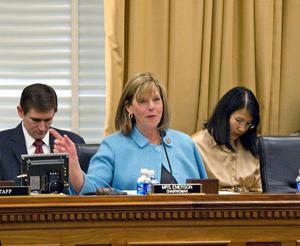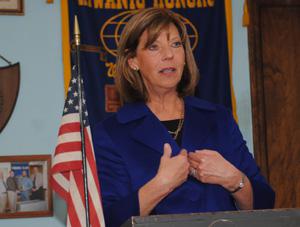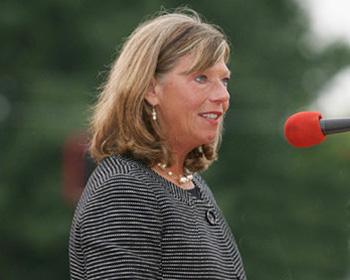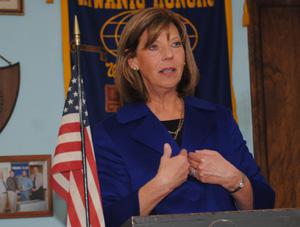
By Jo Ann Emerson
In the Old Testament, the Book of Isaiah says, “For unto us a child is born; unto us a son is given.” Isaiah’s words foretold the birth of Christ, and they hold special meaning for all Christians during this blessed season.
But, taken more broadly, the same quote means that we on earth have a responsibility to one another – to be kind, to be charitable, to be patient and good. Every child, from its very first moments, is on its way to joining a community – whether it’s a loving family, one of our Missouri cities, a nation of citizens, or simply taking a rightful place among all of God’s children.
The striking statistics about childhood homelessness released this month, then, should give pause to each and every one of us. In America today, one in 45 children is homeless: 1.6 million of them, with more than half of that number under the age of seven. They sleep in cars at night, they wash up every morning in a gas station bathroom, and they eat what they can get when they can get it.
These homeless American children have no bed to call their own, they cannot gather around a kitchen table to eat or do homework, and they don’t know the safety of a home. As a result, they encounter challenges to their health, hunger and education. Some of these kids overcome the odds. Others find a place at a shelter or a motel room provided by a charitable organization. Still others escape homelessness when the parent who has been looking for a job for months finally finds one.
But there are others who are not so fortunate over the long run. They may live in homes where drugs have taken over the household. They may suffer from untreated illnesses. They may be close to giving up hope as they struggle to keep their families together. It’s a lot to ask from anyone, let alone a child.
When Missourians contribute to charity, when we donate to food banks, when we volunteer and when we make an offering through our places of worship – we are getting involved in the young lives at the heart of this problem.
Helping our homeless is not a religious calling, it is a national calling. Children, veterans, families, the mentally ill – all make up startling proportions of the homeless population. We have a responsibility to care.
I realize it is easy to call our obligation to the homeless to mind at Christmas, but really this is a year-round issue for the nation. Children are living on the street not just in urban areas – it happens in rural America, too, in every state of the Union. Fortunately, in every community, there are organizations using public and private resources to help.
Wonderful counselors, advocates and caseworkers do a great service to the homeless family that needs a short-term stipend for a hotel room. Church volunteers open their doors to serve hot meals to the hungry or to send a bag of groceries home with a mother who needs to feed her kids some protein. And good nurses and medical professionals take it upon themselves to go looking for people who need help; they go into homes where a pregnant mother needs advice on nutrition as she takes care of her unborn baby.
When we all do a little extra to help those who truly need it the most, then soon enough that pregnant mother gives birth. Then, when a child is born, we can all hope for its great opportunity and great things to come.
Jo Ann Emerson of Cape Girardeau represents the Eighth District of Missouri in the U.S. House of Representatives.

By Jo Ann Emerson
The folks at the Environmental Protection Agency are different from the rest of us, that’s for sure. Where you and I drive down a county road and kick up a little dust, they see a cloud of “coarse particulate matter” – and they can barely resist their uncontrollable urge to regulate it.
In rural America, we stir up “coarse particulate matter” when driving down an unpaved road, moving livestock, or working in a dry field. Our farms, ranches, small businesses and local economies encounter these conditions all the time. But the EPA would like to stifle productivity, growth and employment if it means disturbing the dust.
Compliance with EPA dust standards, in the open air, as a farm truck goes down a gravel road, is about the last thing from Missourians’ minds. And it should be. The mere idea that a federal agency would get so deep into the operations of private businesses is offensive to anyone who believes in the basic freedoms, let alone the free market.
Of course, the EPA now says it will not start to regulate dust just yet. However, I have learned to judge federal agencies not by what they say but by what they do. And there are no guarantees that the EPA will continue to ignore regulatory actions that bureaucrats there have pressed forward in the past. We’re not talking about the survival of a small business here, a farm over here and a ranch over there; we’re talking about a threat to the survival of whole industries, primarily in agriculture.
It is clear that Congress must be on the record about farm dust, and now it is. I voted last week in favor of the Farm Dust Regulation Prevention Act and, if the legislation sounds straightforward, it is.
Regulatory overreach is a hallmark of this Administration. Time and again, rules and regulations are laid at the feet of Americans who are attempting to do nothing more than make an honest living.
Not only are burdensome regulations out-of-touch with people who are working for a living all over our country, but they are also directly opposed to the economic opportunity and growth that will grow our economy at a crucial time.
Just last week, the administration issued seven new rules. The compliance cost of just one of them is estimated at more than $140 billion. Altogether, they represent a burden of hundreds of thousands of hours to read, understand, and adapt to new rules. And each one of those dollars and every one of the hours spend struggling to comply with the new rules of the federal government is a dollar or an hour NOT spent on a business, employing a new worker, or investing in the future.
The basic premise of federal regulation is to restrict some kind of activity. When potential regulations reach the point at which we can’t even drive down a country road, we have to ask why there is not more commonsense and accountability from our federal government. An administration which fails to answer to working Americans will soon have to answer to all Americans.
Jo Ann Emerson of Cape Girardeau represents the Eighth District of Missouri in the U.S. House of Representatives.

Seventy years ago, our nation was attacked at Pearl Harbor. In Southern Missouri, many citizens remain among us who lived through that day and the war that followed. They are a present part of our history. They served and sacrificed so that our nation might survive the aftermath of the Japanese massacre that Hawaii morning, December 7, 1941.
Wartime America in the years that followed demonstrated the strength, courage and character of our nation. Every family sacrificed something… a loved one who enlisted, a mother who went to work, or rationing of food, gas and other basic materials. But it was always the tragedy of Pearl Harbor that rallied our spirits during dark times. The memory of that somber day awakened our will to win the war in the Pacific.
Only a few thousand survivors of the battle of Pearl Harbor remain with us today. These Americans, in their eighties, nineties and hundreds, are national treasures and witnesses to a lesson in history we must not let slip.
The defense of our country from all threats, whether known or unknown, is essential to our very freedom.
We cannot be secure or free without the willingness of Americans to serve in uniform, on the vanguard of our shores, in remote places around the world where forces conspire against liberty and democracy.
We must also remember the code of national sacrifice that allowed us to reach our national goal of victory in World War II. Anyone who lived through the era will tell you that the war effort required every American to put country ahead of self. Everyone went without something in order to help our troops accomplish their mission, and doing so united our entire nation in purpose.
Pearl Harbor reminded us, just as September 11th did, that our freedoms make us a target for other nations and organizations around the globe. We are a light of liberty to the rest of the world, but it is not simply the fact of our liberty that makes others envious – it is how well we make use of our liberty to achieve great things.
The ensuing war reminded us that we are unique among nations for what we Americans can accomplish through tremendous combined effort. We must always be ready to make that effort. We must always observe the responsibilities of our freedom.
And, in retrospect, it is clear that the sacrifices of World War II were not made selfishly for the Greatest Generation of that era, but for their children, grandchildren, and great-grandchildren. They gave everything so freedom would survive through the generations. There is no greater gift than that, and no greater debt we must repay.
Unfortunately, it is all too often tragedy or adversity that causes us to realize these precious things about our nation. But the anniversary of a dramatic, unprovoked assault on our nation serves as no better time to recall the great blessings we must protect beneath our ever-present flag.
The motto of the Pearl Harbor Survivors Association serves to instill in us the important legacy of that grave day 70 years ago. It says: “Remember Pearl Harbor – Keep America Alert – Eternal Vigilance Is the Price of Liberty.”
Jo Ann Emerson of Cape Girardeau represents the Eighth District of Missouri in the U.S. House of Representatives.

By Jo Ann Emerson
At first I thought it must be a hoax – a fifteen cent tax on Christmas trees from the U.S. Department of Agriculture. But after looking it up in the Federal Register (the report of all the regulations issued by the executive branch of government), I found it to be true.
Right there in black and white, on November 9th, the Federal Register says, “Under the Order, producers and importers of fresh cut Christmas trees will pay an initial assessment of fifteen cents per Christmas tree.” The new tax is for “an industry-funded promotion, research and information program for fresh cut Christmas trees.”
A tax to pay for a new program to tell us how important something is that we already value and enjoy. Taxing a beloved product so the government can fix its “image problem”? There is no better illustration of how dangerous, detrimental, and expensive an oversized government bureaucracy can be to the health of our nation.
The president quickly backed away from the tax which, in fairness, growers of Christmas trees were in favor of imposing. But the Obama Administration only delayed implementation of the tax after a public outcry had begun. Clearly, this was not a tax the Administration found problematic, nor was anyone in the White House sensitive to the fact that Americans do not want new taxes to pay for programs they do not want.
The dissatisfaction and outrage at the executive branch often defies explanation. I’m as adamant as anyone that the bureaucracy is too big, costs too much money, and sticks its nose where it doesn’t belong. But there are few real-life examples of just how this Administration has taken big government to its extremes.
The Christmas Tree Tax ought to assure us we can all stop looking for that perfect example of bureaucratic excess.
Last year, the Administration wanted dairy producers to comply with oil spill rules for the milk they store on their farms. Because, they said, milk is an oil. Again, the Obama Administration realized it was going too far and stepped back from the regulation.
Yet much more damaging examples abound, like the carbon cap-and-tax scheme to double the energy costs of every family in Missouri. No example goes to the extremes of the new health care law, with massive cuts to Medicare, new taxes on Americans who don’t buy health insurance and thousands of new regulations on employers and individuals who use our American health care system – in short, all of us.
This is how an aggressive bureaucracy gains a foothold in more aspects of the day-to-day lives of American citizens.
One way to stop this behavior at the highest levels is by opposing the Administration at every turn. Even then, Congress is limited in its ability to thwart the President’s attempts to regulate through Executive Orders and government agency actions.
The most powerful way to oppose these creeping assertions of power by the federal government is to make them as public as possible and to express our dissatisfaction with them, loud and clear. It’s just a shame that the battle against big government even extends to that cherished family outing to bring home our Christmas trees.
Jo Ann Emerson of Cape Girardeau represents the Eighth District of Missouri in the U.S. House of Representatives.

This Veterans Day, on 11-11-11, communities all over America will pause in appreciation of the men and women who have served our country in uniform. Our freedom depends on the Americans who are willing to defend it, and we are very fortunate in Missouri to have veterans in every community and nearly every family.
In and out of uniform, American servicemembers and veterans make invaluable contributions to our communities, as volunteers, as role models, and as defenders of a tradition of service that characterizes who we are and how much we love our country.
But when it comes time to appreciate our veterans, it’s well worth keeping in mind what we can do for them, as citizens of the grateful nation they have sacrificed to protect.
The newsmagazine 60 Minutes aired a moving piece last week that featured a program under which disabled veterans could return to Iraq, rejoining the ranks of their fellow troops and visiting the places where they were injured. The trips promote healing, but they also remedy the incredible disconnect between blacking out from blood loss on the Iraqi field of battle and waking up three weeks later in Walter Reed Army Medical Center -- 6,192 miles away from Baghdad.
The architect of the program for these young veterans is not a servicemember or even a doctor, he is an advertising executive from Washington, DC, who regularly visited troops at Walter Reed and heard them say, over and over, that they wanted nothing more than to return to their units back in Iraq. He listened to them when medical staff said such a thing was impossible, and he understood.
In Southern Missouri, and in many places around the nation, there is an annual Honor Tour. Ours raises donations from the community which pay for veterans of World War II to visit the nation’s capital. There, they see the monument erected to their service. They walk through the airport to an avalanche of applause, and they meet Americans – perfect strangers – who want nothing more than to thank them for their service. And if they come to Capitol Hill to visit their elected representatives, they see a black POW-MIA flag outside each office, proclaiming “You Are Not Forgotten.”
Back home, no day like Veterans Day reminds all of our veterans that this is true. In schools, our students participate in programs to honor all the members of the community who have served in uniform. Some are inspired to follow in their footsteps by attending the nation’s service academies or by enlisting in a branch of service. There is no greater tribute to our veterans than to follow in their footsteps.
Other places in our communities, like parks, cemeteries, and the many memorials and monuments to veterans in Southern Missouri, feature celebrations of the men and women who have left their homes to defend our freedoms. To get to these events, we might drive on highways named for a veteran.
Unlike Memorial Day, Veterans Day is an uplifting day – and it is a chance to say thank you to the veterans who sit around our dinner tables, live on our streets, work in our communities, volunteer for public service, and share with us their tradition of patriotism and pride, both in uniform and out of it.
There are many ways to say ‘thank you,’ but by honoring and serving American veterans in all these special ways, we let them know that their contributions to our nation are precious and sacred, and we love them for it. As a group of millions of regular Americans who have given so much to the country we love, they will always be our nation’s first and best heroes.
Jo Ann Emerson of Cape Girardeau represents the Eighth District of Missouri in the U.S. House of Representatives.

